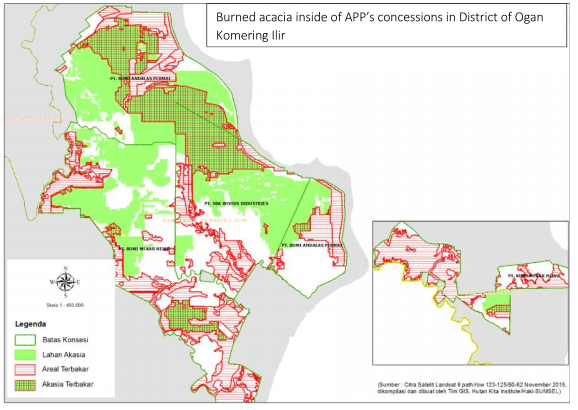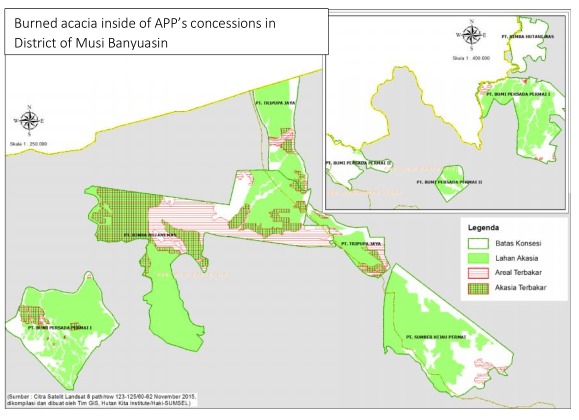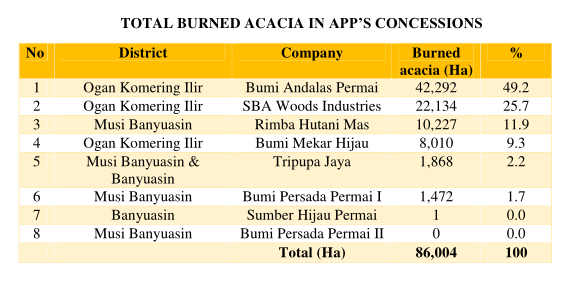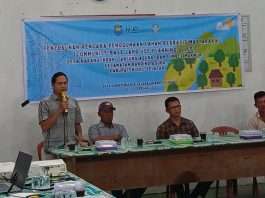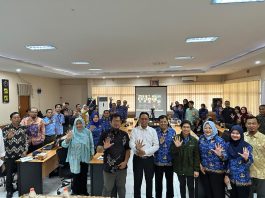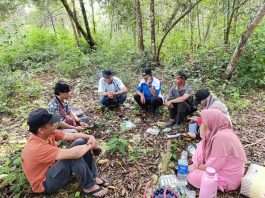2015 Fires Burned 26% of APP’s Plantations in South Sumatra, Raising Questions about Fiber Supply for New OKI Mill.
This report uses NASA active fire data to classify active fire locations spread across all APP concession inSouth Sumatra. We also used USGS Landsat 8 with time seriesbasisfrom2013-December 2015to track land cover changes on the concessions.The satellite data was ground checked in November and December 2015, at which time the photographs presented in thereport were taken.
In early December 2015, this coalition of local NGOs in South Sumatra reported spatial analysis results indicating that the total burned areas inside of concessions associated with Asia Pulp and Paper in South Sumatra was 293,065 Ha, or nearly 37% of its entire concession area in the province. (^1)
Now, this coalition reports its analysis of how much of APP’s pulpwood plantations, primarily Acacia trees, burned in the 2015 fires. The spatial analysis supported by ground checks indicates that 86,004 Ha of APP’s plantations in South Sumatra were burned. This amounts to about 26% of APP’s total planted area in the province. Our analysis raises serious questions about how this significant plantation loss will influence the fiber supply for APP’s new mega-scale pulp mill, PT. OKI Mill, which the company has announced will start operation later in 2016. This mill, according to company statements, will have a capacity of 2 million tons of pulp and 500,000 tons of tissue per year, which will make it one of the largest pulp mills in the world.(^ 2 )
APP’s deputy director for Sustainability and Stakeholder Engagement, Ms. Aniela Maria, confirmed that the fires had affected its plantations in an article in Straits Times published on November 9, 2015. (^3)
According to Ms. Maria, “However, we have not yet completed verifications and do not want to speculate. The verifications of areas affected will be done together with the government of Indonesia.” As of the beginning of February 4, 2016, APP has not made public the progress or results of its “verification” of burned areas. In September 2014, APP claimed that an “independent” study confirmed the group has sufficient plantation resources to meet the pulp requirements of its existing mills in Riau and Jambi as well as its future mill currently being constructed in OKI, South Sumatra. According to this study, the only gap in fiber supply for the three mega-scale pulp mills would occur in 2020. (^4)
Since neither this study nor any of its supporting data was made available for public review, the meaning and underlying assumptions of the fiber sufficiency claims are impossible to verify. Now, after the massive 2015 fires inside APP concessions, this 1.5 year-old claim of
fiber sufficiency deserves even greater scrutiny.
(^1) https://hutaninstitute.or.id/70-burned-area-inside-forest-concessions-in-south-sumatra-links-to-app/
(^2) http://regional.kompas.com/read/2015/11/20/19545661/Tahun.Depan.Pabrik.Kertas.Terbesar.di.Asia.Tenggara.
Beroperasi.di.Sumsel
(^3) http://www.straitstimes.com/asia/se-asia/apps-bottom-line-takes-a-hit-from-indonesia-plantation-fires
(^4) https://www.asiapulppaper.com/news-media/press-releases/independent-study-shows-asia-pulp-and-paper-has-
sufficient-plantation-its-zero-deforestation-commitment
TOTAL BURNED ACACIA IN APP’S CONCESSIONS
In light of this situation, this coalition calls on APP, and key stakeholders including NGOs and Government to do the following:
- APP must release the results of its “verification” of burned areas, indicating how much of set aside conservation and community areas were burned, how much area undergoing HCS and HCV assessments burned, and how much of their planted pulpwood trees (by age class) were burned
- APP must fully restore burned land to natural ecosystems, especially in set aside areas and rewet drained peatlands on its concession areas to drastically reduce fire risk on concession land and for surrounding communities
- APP must acknowledge that the massive areas of drained peatlands on which its plantations sit are extremely prone to fires and that it is within the company’s power to rewet the peatlands and significantly reduce the fire risk in South Sumatra province.
- APP must conduct a new, comprehensive assessment of short and long term fiber supply that considers the fiber requirements of both its existing mills and the new OKI mill functioning at full capacity. This assessment process must be transparent and the results made available for public review before the OKI mill begins production.
- APP must indicate where it intends to source fiber for its existing mills and the new OKI mill if its plantations in Sumatra cannot produce sufficient fiber. The company has only provided ambiguous responses to this question, saying that it would find “other sources” or “import” wood. The company should reaffirm its commitment not to use any mixed tropical hardwood fiber in its mills.
- The massive 2015 fires clearly demonstrate APP’s inability to comply with its legal obligation to prevent or control forest and land fires on its concessions. Therefore, the Government of Indonesia must conduct environmental audits, review licenses, and follow up any legal violations with appropriate law enforcement.
- APP must immediately undertake efforts to resolve all outstanding conflicts with communities. If there is community loss such as garden and/or forest damaged due to fires that spread from APP’s operations, APP should compensate.
- Civil society, including those organizations supporting APP in its FCP commitments,must use this report’s findings to call on APP for details about how it intends to maintain its FCP commitments alongside operating its new OKI mill, especially in light of fiber supply problems resulting from the 2015 fires.
- Civil society should use the results from this analysis to inform APP’s external stakeholders including financial institutions, suppliers, and buyers about the consequences of the 2015 fires and the risks that developing plantations on drained peatlands poses for APP’s future fiber supply.
CONTACT PEOPLE
1. Hutan Kita Institute – HaKI : Aidil Fitri/ 0812 711 0385
2. WALHI South Sumatra : Hadi Jatmiko/ 0812 7312042
3. Pilar Nusantara – PINUS : Rabin Ibnu Zainal/ 0811 718481
4. LBH Palembang : Aprili Firdaus/ 08127137958
5. Jaringan Masyarakat Gambut – South Sumatra : Sudarto Marelo/ 082177970742
6. FKMPH : Sigid Widagdo/ 0821 78832132
7. LSM BAKAU : Paisal Sungutan/ 0813 66598666
8. Rimba Institute : Yuliusman/ 082175102581



